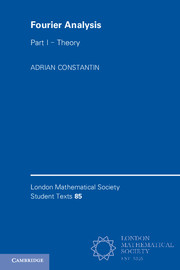Book contents
- Frontmatter
- Dedication
- Contents
- Preface
- 1 Introduction
- 2 The Lebesgue measure and integral
- 3 Elements of functional analysis
- 4 Convergence results for Fourier series
- 5 Fourier transforms
- 6 Multi-dimensional Fourier analysis
- 7 A glance at some advanced topics
- Afterword
- Appendix Historical notes
- References
- Index
Afterword
Published online by Cambridge University Press: 05 May 2016
- Frontmatter
- Dedication
- Contents
- Preface
- 1 Introduction
- 2 The Lebesgue measure and integral
- 3 Elements of functional analysis
- 4 Convergence results for Fourier series
- 5 Fourier transforms
- 6 Multi-dimensional Fourier analysis
- 7 A glance at some advanced topics
- Afterword
- Appendix Historical notes
- References
- Index
Summary
This being a textbook, it would seem appropriate to offer to the aspiring mathematician/prospective graduate student, from the author's perspective, some subjective points of view that could be worth pondering at the beginning of the journey towards advanced mathematics.
There is a strong parallel between mountain climbing and mathematics: both are very hard work, and both give their enthusiasts lots of pleasure in what they achieve, along with a view of the world that most people don't get. Both activities expose the usual fallacy of only looking at the immediate, obvious risks, and not taking a long-term view. Also, just like after completing the struggle to find a route to the summit, other possible routes may be discerned for the descent or for subsequent ascents; so in mathematics, once an approach is found, other mathematicians can usually find an alternative that is often much better and/or shorter. Indeed, one can push the comparison further. Learning about an unknown but well-established subject is to some extent similar to taking a trip to a vast unknown area that is considered to be a tourist attraction. There are guidebooks, maps and route signs. It is advisable to start by taking the main road and having a look at some of the recommended attractions. Once one is familiar with the basic layout, a favourable first impression might entice one to look more closely. Often old, practically forgotten trails have much to offer. In following the lure to explore uncharted territory by venturing off the trail one should, however, be wary of inadequate preparation. In the mathematical context, the more you know about the background and the more techniques you master, the vaster are the opportunities that you can try out. In particular, a proof is the outcome of the interaction between creative imagination and critical reasoning; further, rigorous formal proofs become really important in the advent of a crisis, e.g. a counter-intuitive behaviour, or when a paradox of some kind arises. For this reason, one ought to master the basic tools that are available, seeking also to get acquainted with recent technical advances.
- Type
- Chapter
- Information
- Fourier Analysis , pp. 335 - 336Publisher: Cambridge University PressPrint publication year: 2016



